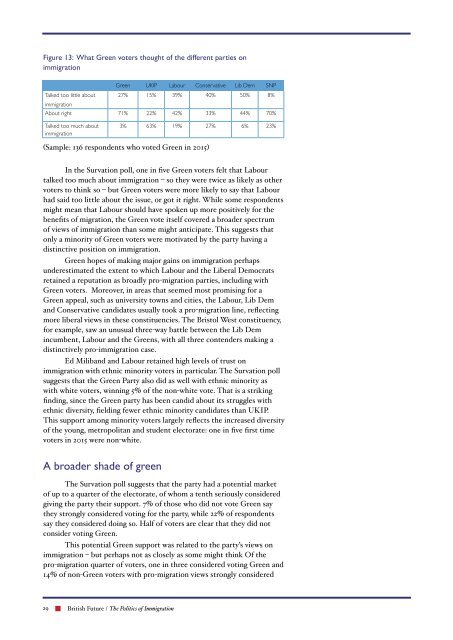THE POLITICS OF IMMIGRATION
The-politics-of-immigration
The-politics-of-immigration
You also want an ePaper? Increase the reach of your titles
YUMPU automatically turns print PDFs into web optimized ePapers that Google loves.
Figure 13: What Green voters thought of the different parties on<br />
immigration<br />
Green UKIP Labour Conservative Lib Dem SNP<br />
Talked too little about 27% 15% 39% 40% 50% 8%<br />
immigration<br />
About right 71% 22% 42% 33% 44% 70%<br />
Talked too much about<br />
immigration<br />
3% 63% 19% 27% 6% 23%<br />
(Sample: 136 respondents who voted Green in 2015)<br />
In the Survation poll, one in five Green voters felt that Labour<br />
talked too much about immigration – so they were twice as likely as other<br />
voters to think so – but Green voters were more likely to say that Labour<br />
had said too little about the issue, or got it right. While some respondents<br />
might mean that Labour should have spoken up more positively for the<br />
benefits of migration, the Green vote itself covered a broader spectrum<br />
of views of immigration than some might anticipate. This suggests that<br />
only a minority of Green voters were motivated by the party having a<br />
distinctive position on immigration.<br />
Green hopes of making major gains on immigration perhaps<br />
underestimated the extent to which Labour and the Liberal Democrats<br />
retained a reputation as broadly pro-migration parties, including with<br />
Green voters. Moreover, in areas that seemed most promising for a<br />
Green appeal, such as university towns and cities, the Labour, Lib Dem<br />
and Conservative candidates usually took a pro-migration line, reflecting<br />
more liberal views in these constituencies. The Bristol West constituency,<br />
for example, saw an unusual three-way battle between the Lib Dem<br />
incumbent, Labour and the Greens, with all three contenders making a<br />
distinctively pro-immigration case.<br />
Ed Miliband and Labour retained high levels of trust on<br />
immigration with ethnic minority voters in particular. The Survation poll<br />
suggests that the Green Party also did as well with ethnic minority as<br />
with white voters, winning 5% of the non-white vote. That is a striking<br />
finding, since the Green party has been candid about its struggles with<br />
ethnic diversity, fielding fewer ethnic minority candidates than UKIP.<br />
This support among minority voters largely reflects the increased diversity<br />
of the young, metropolitan and student electorate: one in five first time<br />
voters in 2015 were non-white.<br />
A broader shade of green<br />
The Survation poll suggests that the party had a potential market<br />
of up to a quarter of the electorate, of whom a tenth seriously considered<br />
giving the party their support. 7% of those who did not vote Green say<br />
they strongly considered voting for the party, while 22% of respondents<br />
say they considered doing so. Half of voters are clear that they did not<br />
consider voting Green.<br />
This potential Green support was related to the party’s views on<br />
immigration – but perhaps not as closely as some might think Of the<br />
pro-migration quarter of voters, one in three considered voting Green and<br />
14% of non-Green voters with pro-migration views strongly considered<br />
29 British Future / The Politics of Immigration


